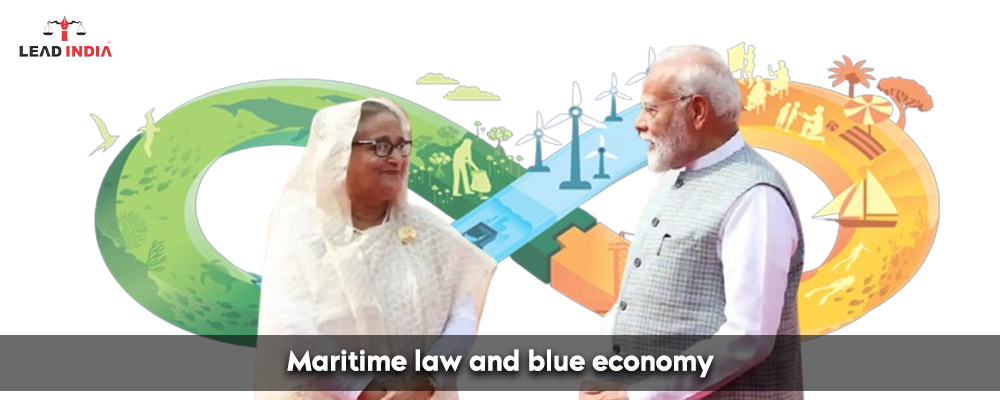The Blue Economy is a new concept that advocates for the sustainable use, innovation, and stewardship of our ocean and its valuable ‘blue’ resources. In the classic ‘business-as-usual’ strategy, governments have historically expanded their ocean-based economies by exploiting maritime and marine resources such as shipping, commercial fishing, and oil, gas, and mineral extraction. However, the long-term effects of these activities on the health and productivity of these resources, as well as the complex ecosystems in which they live, are frequently disregarded. The ‘blue economy’ provides a more holistic perspective that includes sustainable economic growth while minimizing impact on other sectors. Similar to the ‘green economy,’ the blue economy strives to balance human well-being, social equality, and environmental sustainability.
Need A Legal Advice
The internet is not a lawyer and neither are you. Talk to a real lawyer about your legal issue

It not only promotes economic opportunities but also protects and fosters intangible ‘blue’ resources such as traditional ways of life, carbon sequestration, and coastal resiliency. It attempts to help vulnerable states mitigate the disastrous effects of poverty and climate change.
The worldwide ocean economy is currently valued at around $1.5 trillion per year, making it the world’s seventh-largest economy. It is projected to double by 2030, reaching $3 trillion. The overall value of ocean assets, often known as natural capital, is estimated to exceed $24 trillion.
The International Legal Framework
- United Nations Treaty on the High Seas: The United Nations Treaty on the High Seas is an international agreement designed to protect and manage marine biodiversity in areas beyond state authority. These areas, known as the high seas, account for a large fraction of the world’s oceans and are critical for marine life and ecosystems. The pact, which is a product of the 1958 Geneva Convention on the High Seas, reflects a concerted effort by UN member states to address the urgent need for the conservation and responsible use of these precious maritime resources.
- UNCLOS and its significance for the Blue Economy: The United Nations Convention on the Law of the Sea (UNCLOS) is a critical international legal framework for managing the world’s oceans. UNCLOS, which was created in 1982, is very relevant to the Blue Economy, which focuses on the sustainable use of ocean resources for economic growth, livelihood enhancement, and environmental preservation.
- International Rules and Agreements for Sustainable Maritime Development: UNCLOS establishes essential ideas such as the precautionary principle, ecosystem-based management, and the obligation to conserve the maritime environment. These principles govern the development of legislation and agreements dealing with concerns such as overfishing, pollution, and the protection of sensitive marine ecosystems.
- Maritime boundaries, jurisdiction, and coastal states’ rights: The UN Convention on the Law of the Sea defines regulations for marine boundaries, jurisdiction, and coastal governments’ rights. It defines territorial seas, establishes exclusive economic zones (EEZs), and guarantees innocent passage within international straits. These laws promote peaceful cohabitation and equitable use of marine resources among coastal states. UNCLOS also addresses the establishment of baselines and continental shelves, defining the scope of national jurisdiction over maritime areas.
The blue economy and maritime security are intricately linked, with maritime security being a critical component of environmentally responsible economic development and marine resource conservation. The ocean has a wide range of economic development opportunities, including fisheries and aquaculture, as well as tourism and alternative energy. Piracy, illegal fishing, and human trafficking are just a few of the security threats involved with these activities.
To guarantee proper marine security, governments and public and private sector institutions must work together. Furthermore, promoting maritime security may help safeguard the environment, preserve marine biodiversity, and promote regional and global collaboration. As a result, ensuring the long-term sustainability of ocean resources necessitates addressing the threats posed by maritime security concerns while also supporting environmentally responsible economic growth.Lead India offers free legal advice and online information, in addition to other legal services. We provide a forum to Talk to a lawyer and ask legal questions. Lead India’s solicitors can help you with any legal difficulties. Lead India’s solicitors may assist you with any legal issues. Lead India also offers free online legal help in India. In addition to giving online legal assistance, Lead India allows users to ask specialist questions for free.





 Talk to a Lawyer
Talk to a Lawyer